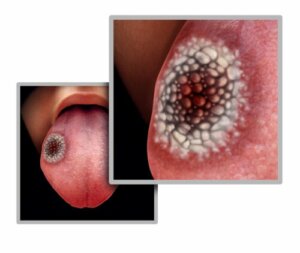Five Possible Symptoms of Tongue Cancer


Written and verified by the doctor Nelton Abdon Ramos Rojas
Tongue cancer, technically known as oral or oropharyngeal cancer, is one of the least common kinds of cancer. In most cases, people with tongue cancer are lifelong smokers or drinkers.
Statistics indicate that it’s more common among men more than women, and lately, the number of people with oral or oropharyngeal cancer has risen.
As with any disease, certain symptoms appear that are indications of what is going on. If you suspect you may be sick, pay attention to the following 5 symptoms of tongue cancer.
However, please note that these symptoms are the most general ones and are not 100% indicative that you have cancer. If you have any health issues, remember that you should see your doctor to get checked out and to get properly diagnosed.
Risk factors
According to the experts of the American Cancer Society, these are the main risk factors for tongue cancer. Take note!
1. Smoking

Because of their detrimental effects on health, both alcoholism and smoking are among the main risk factors for various cancers and other diseases. That’s why it’s on the list for tongue cancer.
Stanford Children’s Health experts say the following about regular tobacco use:
“All tobacco products, including cigarettes, cigars, pipe tobacco, chewing tobacco and tobacco itself, contain toxins (poisonous substances), carcinogens (cancer-causing agents) and nicotine (addictive substance)”.
Toxic substances weaken the immune system and damage cells, making the body more vulnerable to disease, say experts at the Centers for Disease Control and Prevention (CDC).
Read this article too: Health-Related Signals from Your Tongue
2. Alcoholism
The scientific community agrees that, like tobacco, alcohol consumption increases the risk of all kinds of diseases, including tongue cancer.
In this regard, the National Cancer Institute team comments as follows:
“Alcoholic beverages may also contain a variety of carcinogenic contaminants introduced during fermentation and production, such as nitrosamines, asbestos fibers, phenols and hydrocarbons.”
So, the more alcohol and tobacco a person consumes on a daily basis, the greater the risk of developing tongue and other cancers. Therefore, health experts say that the ideal would be to stop these harmful habits.
3. Diet
A bad diet is harmful in many cases because it doesn’t provide the body with everything it needs. In this sense, junk food can satisfy your appetite but doesn’t contribute anything to your health in either the short or long term.
A diet excluding fruits, vegetables, and berries has been found to increase the risk of tongue cancer and many other diseases.
4. Human papillomavirus (HPV)

According to CDC data, many people are exposed to HPV throughout their lives. It can infect the mouth – and therefore the throat and cause tongue cancer. “HPV is believed to cause 70% of oropharyngeal cancers in the United States.
Possible symptoms of tongue cancer
Oropharyngeal cancer affects the mouth, throat, and tonsils. Furthermore, it’s notorious for affecting the base of the tongue. Below are some symptoms that could indicate that something isn’t right and that it’s time to consult your doctor.
1. Tongue ulcers
Painful ulcers or sores that do not respond well to medication are one of the first symptoms of tongue cancer. Normally, ulcers are painful and very uncomfortable. However, the difference here is that these are much more sensitive and appear very frequently.
It’s important not to confuse them with normal ulcers or oral herpes, so pay attention to the level and duration of the pain.
2. Tongue cancer: pain

The pain caused by tongue cancer is not limited to just the tongue. It may also extend throughout the mouth and throat.
- You may feel it during everyday activities like drinking liquids or chewing food.
- Depending on the pain while swallowing or chewing, this may be an indication of cancer, though it may also be attributed to throat infections, tonsilitis, or an allergy.
Pay close attention to the intensity and duration of the pain. If it lasts longer than a week and you see other symptoms like spots on your tongue, it’s best to get examined by a doctor and properly diagnosed.
You might be interested in Mouth Ulcers or Sores: Everything You Need to Know
3. Spots on your tongue
Spots are another big indication that you may have tongue cancer. They are usually white (leukoplakia) or red (erythroplakia) and last longer than two weeks. So, if this is you, you should see a doctor and find out what’s going on. However, if your doctor decides it’s necessary, they’ll do a biopsy to analyze the spots.
4. Bad breath
Bad breath in addition to the above symptoms is very common. It goes away when you brush your teeth and tongue, but it comes back quickly and may be accompanied by a bloody taste in your mouth.
5. Tongue cancer: bleeding tongue

Many people confuse bleeding on the tongue with bleeding gums or ulcers. That’s why finding out where the bleeding is coming from is important.
- Firstly, clean your tongue after eating with a cotton ball to figure out where the blood is coming from.
- See a doctor if you constantly taste blood in your mouth.
What to do if you have tongue cancer symptoms
People with mouth cancer may or may not have symptoms. It’s also important to note that the above symptoms are not exclusive to this type of cancer. They can also be indicative of other illnesses. However, if you’re experiencing any of these symptoms, The American Society of Clinical Oncology recommends that you see your dentist for an exam.
It’s important to note that people with mouth cancer may have some symptoms, but this isn’t always the case. When in doubt, it’s best to consult your dentist.
This text is provided for informational purposes only and does not replace consultation with a professional. If in doubt, consult your specialist.








